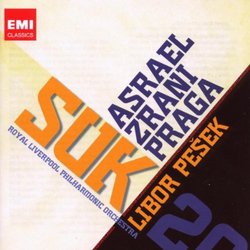| All Artists: Josef [Composer] Suk, Libor Pesek, Royal Liverpool Philharmonic Orchestra Title: Josef Suk: Asrael; Zrání; Praga Members Wishing: 1 Total Copies: 0 Label: EMI Classics Original Release Date: 1/1/2008 Re-Release Date: 7/22/2008 Genre: Classical Styles: Forms & Genres, Theatrical, Incidental & Program Music, Symphonies Number of Discs: 2 SwapaCD Credits: 2 UPCs: 400000009483, 5099920687328 |
Search - Josef [Composer] Suk, Libor Pesek, Royal Liverpool Philharmonic Orchestra :: Josef Suk: Asrael; Zrání; Praga
 | Josef [Composer] Suk, Libor Pesek, Royal Liverpool Philharmonic Orchestra Josef Suk: Asrael; Zrání; Praga Genre: Classical
|
Larger Image |
CD Details |
CD ReviewsTWO DEATHS AND ONE LIFE DAVID BRYSON | Glossop Derbyshire England | 03/11/2010 (5 out of 5 stars) "Each of the two cd's forming this set lasts just a little over an hour. The natural thing for the producers to do has been to put the Asrael symphony on one disc and the two big symphonic poems on the other, but after the first hearing I found that I preferred to play the works in their order of composition. This order is Praga first, then Asrael and finally the late tone poem Zrani, which being interpreted is `Ripening'. Praga represents the composer's early confident maturity, but it was not long before tragedy struck twice. First his revered father-in-law Dvorak died in 1904, and only a year later Suk suffered the body-blow of the sudden death of Otylka, his wife and Dvorak's daughter. It seems that the symphony was in the course of composition when Otylka was taken from him, and both the work and its creator must have emerged from the second tragedy deeply changed. A few years later Suk produced Zrani, a kind of Heldenleben with a less arrogant title. Among them the three works depict one man's life-story in music, and it is as musical autobiography that they make the best sense to me.
Having been encouraged to acquaint myself better with Asrael, I picked this version on the strength of a review that sounded convincing, and for what it may be worth I endorse the recommendation. The style of all three works is big and grandiose, and Pesek gets that effect admirably out of the Liverpool Philharmonic. The numerous solos are beautifully and expressively done, but above all any interpretation of these works needs to feel and convey the human grief and compassion that are at their core. The story of Suk's life was very different from Strauss's, and Suk had more taste than to depict himself as a hero. He had more taste, but I hope it can be said without insensitivity that he also had less genius. He aims at the loftiest kinds of expression and to a great extent he achieves them, but the right kind of interpreter needs to sense his subject's limitations so that he succeeds in expressing dignity without pretentiousness. Pesek seems to me to handle this delicate matter admirably, and I suppose his Czech nationality helps. It is a long time now since Talich, and I don't know whether Czech musicians make such exclusive claims as they once did to insight into Czech music. These accounts sound more westernised to me, but in the absence of western performances to compare I shall risk the guess that there is special affinity here between composer and interpreter. The recordings date from 1991 and 1993. To tell the truth, they are not the best I know from that period, but they are basically good and I don't want to reduce the 5-star rating because this set has so much going for it. The `problem' is that the dynamic range is wide, and a setting that allows the pianissimo level to be heard can be rather overpowering at some of the climaxes, such as the end of Praga. The sound is not the last word in vividness either, but a little imagination in using the hi-fi controls ought to help. In the presence of Asrael the Angel of Death it is probably rather flippant to mention that the conductor's first name, Libor, has been all too familiar in news contexts recently, being also the acronym for London Inter-Bank Offered Rate, the rate with which our banking behemoths have been trying to frighten each other off trying to borrow. I mention finance at all only because this very interesting set can be obtained very economically. I wish the liner note had told us something about Maestro Pesek, as it would have done on the Naxos label. However I was interested to see the authorship of the note, being Malcolm MacDonald, a stalwart of The Gramophone in the 50's and 60's. It is good that he is still writing in 2008, and the style is as it always was. The Gramophone's house style epitomised much English musical criticism at that time - bland, smoothed over and quite astoundingly average. You will get a certain amount of anodyne information out of it although hardly much revelation. However it will not mislead you in any way, and if you are interested in this composer, or have even been prompted to take an interest as I have been, it makes its own worthwhile contribution to what I believe is a very significant production." |

 Track Listings (5) - Disc #1
Track Listings (5) - Disc #1